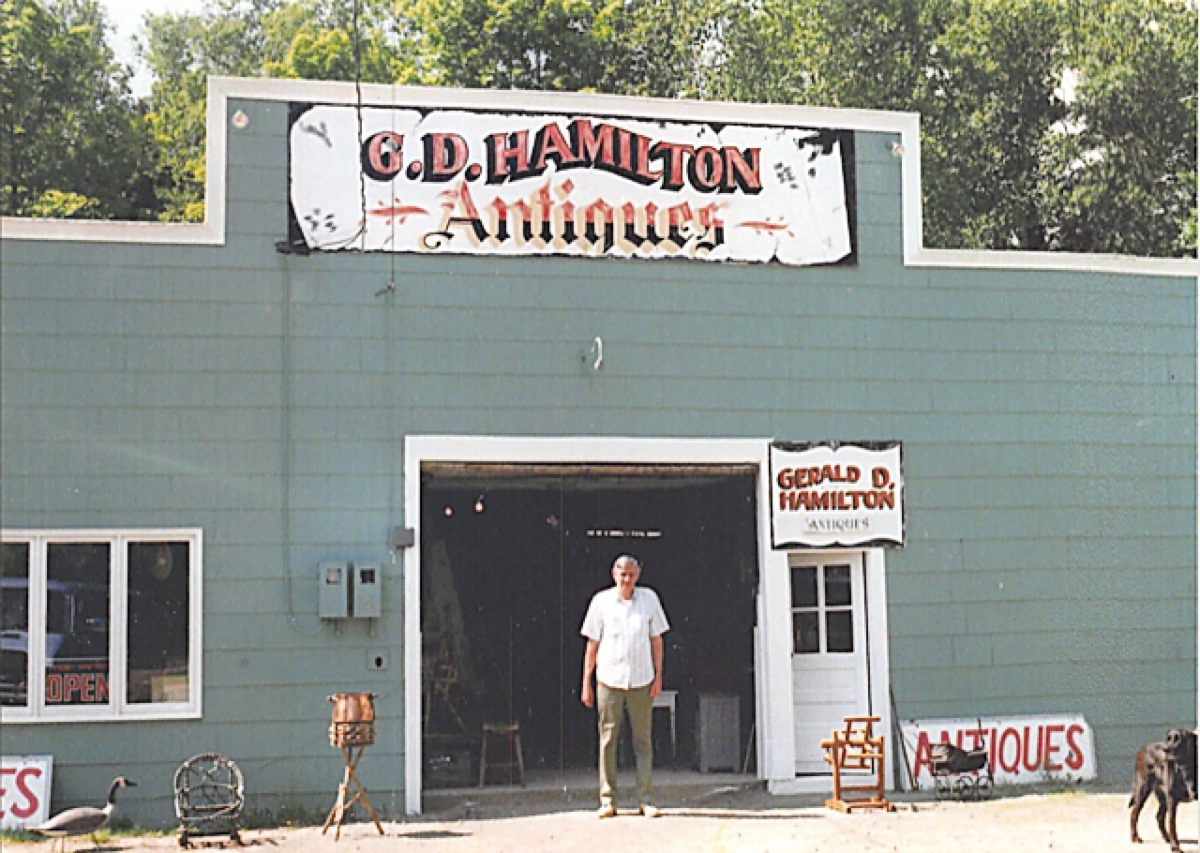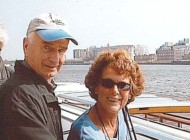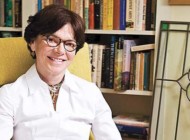I first met Gerry in the early 1970s. Gerry was older than me, but we shared very similar backgrounds and interests and we soon became very good friends. Gerry shared with me that he had been in the Air Force for four years stationed in Fairbanks, Alaska. As a young man, I dreamed of going to Alaska and loved hearing him tell stories about his adventures there.
At the time, we were both in the antiques business and we were both pickers, which meant we went throughout the countryside knocking on doors introducing ourselves, attempting to buy a variety of antiques out of these ancient New England homes and farms. We also acquired things from fellow pickers and were both basically wholesalers.
It was a remarkable time to be in the business. Years earlier, selling antiques could be challenging, but by the early 1970s there was an absolute craze for Victorian furnishings, which was plentiful in almost any New England home. Victorian furnishings sold so well then that if you bought a truckload of Victorian furniture, you could likely have it all sold within a week, sometimes a matter of a couple of days or even before the end of the day was out. It was kind of like being in the Klondike in 1897; there were gold nuggets in the form of antiques everywhere. How well you did in the antiques business was dependent upon how hard you were willing to work and how smart you were at acquiring knowledge. Adding to this was the challenge that Gerry and I worked in small rural areas where most of the antiques tended to be more modest in value. We envied those dealers that lived in more metropolitan areas like Portland or Boston where there was a far more plentiful source of more valuable antiques that one could make more money on. We just had to work a little harder, but it was a profession that we both absolutely loved.
At the time, I was a schoolteacher in a small high school in North Anson, Maine. A few years earlier, Gerry also had been a teacher and the principal in Moscow, Maine, which was about 30 miles north of where I lived at the time. We both attended Maine colleges, Gerry went to Husson Business College in Bangor, Maine.
Both Gerry and I had been introduced to the antiques business by our fathers. Gerry’s dad was the well-known antique dealer, Wally Hamilton, and his mother’s name was Marion. While teaching in the Bingham area, Gerry took a part-time job with a local antique dealer, Maurice Alkins. Maurice had been in the antiques business with his wife for many, many years and prior to that he had been a judge. Maurice had only one eye, but he seemed to see more and do more with that one eye than most could do with two. Gerry learned so much from this crafty old dealer.
We frequently discussed challenges we faced in the antiques business and often times Gerry would share with me what he learned from Maurice on how to deal with these various situations. On one occasion, I managed to buy the entire contents of a building from an old widow and her daughter. After paying them for the contents and preparing to move the things, they suddenly remembered they had to keep some of the items. The two of them began rushing around grabbing things and explaining they just had to keep those things. I was new in the business, not very assertive and didn’t know what to do. I was sick because most of my profit was being taken but I didn’t know what to do about it. I asked Gerry if he ever had that problem and his response was, “Not anymore, old Judge Elkins showed me how to deal with that very easily.”
He went on to explain that he was with Judge Elkins one day when he bought the entire contents of the house and the mother and daughter, also after being paid, realized there were a number of things they needed to keep. The old judge didn’t complain or argue, he simply pulled out a pad of paper and said of course you should be able to keep anything you want, saying, “what else would you like?” as he continued to scribble notes. When they were all through selecting, Maurice presented them with a bill. They were shocked despite the fact that Maurice had already paid them, they thought that they could just take anything they wanted back for free. When they saw the bill, they suddenly realized they didn’t need those things after all.
On another occasion, I had a problem with a dishonest lawyer after buying the contents of an estate and, when I asked Gerry how he dealt with such things, he explained he always carried a Polaroid camera with him when he bid on an estate with a lawyer. He went on to tell me about a specific situation he had years earlier. A country lawyer, who knew Gerry, contacted him and explained he had to settle a local estate. The house and buildings were filled, and he simply wanted Gerry to drop by, get the keys, go look at the place, and then submit an offer. Gerry asked him if the family was going to retain any of the things. The lawyer said no, that there were only a couple of distant relatives in California and no one would be taking anything. Gerry, after carefully reviewing the estate all by himself, went back to the lawyer’s office and submitted an offer in writing for $8,000.
About a week later the lawyer called Gerry and congratulated him, telling him he won the estate and Gerry could stop by to pay the $8,000, pick up the keys and then clean the house out at his leisure. When Gerry showed up at the lawyer’s office to get the keys, he once again confirmed that absolutely no one had been in the house or removed anything. The lawyer said no one had touched anything. Gerry explained that he was going to wait until after he checked the estate before he submitted payment. The lawyer was a little surprised and asked why. Gerry said he now had to compare the Polaroid photos of the contents to make sure everything was still there. The lawyer was a little shocked but finally agreed to wait until after Gerry did his review. Gerry told me he went into the house and discovered various things of little value missing.
When Gerry returned to the lawyer’s office, he announced, “We need to call the sheriff!” Gerry explained that there had been a theft and that somebody broke into the house, but he went on to tell the lawyer that whoever took the things must’ve been really smart because they took many of the more valuable things. The lawyer was in one hell of a fix and he had to do something quick. Finally, the lawyer asked how much the remaining contents were worth. Gerry said the best he could pay now was $5,000 rather than the $8,000 he originally offered. The lawyer had no other choice but to be exposed, so he sold the contents to Gerry for $5,000.
When Gerry started his own business, he moved to Greenville, Maine, and acquired his grandfather’s old auto garage, where he sold from. For a period of time, he also sold real estate. He stayed at this location for nearly 50 years. Gerry and his lovely wife, Pat McDowell, spent most of their life there in Greenville until Pat unfortunately died of cancer in 1992. Together they had two children. Nathan, who eventually became a professor of archaeology at the University of Southern Maine together with his lovely wife, Cyndi, a geologist. They also had a daughter, Cynthia Hamilton, who lives in Kennebunk, Maine. Cindy followed in her dad’s footsteps and became an antique dealer, who is well known and has been very successful. She is the fiancé of well-known Maine country auctioneer, Rusty Farrin.
Greenville, Maine, is a lovely small town in Northern Maine and serves as the gateway to the Northern Maine wilderness. Every time I went to Greenville, my family knew that there would be a stop at the Hamilton’s. First, I visited the shop and then usually we would go over to the house, where my wife would spend time with Pat, and Gerry would entertain me and my two young sons with some of the various interesting items he had collected over the years. On one occasion, he brought out a handful of old envelopes with letters inside written on birchbark. The letters had been written by Harry Oaks, later to be known as Sir Harry Oaks. Oaks and his brother and sister were raised in the nearby town of Sangerville, Maine. After college during the depression, Oaks was determined to search for gold. It was the depression, and no one had any money, including Harry.
His sister, a schoolteacher in Greenville, together with his brother, an engineer, financed him as best they could with a portion of their meager salaries. Harry was always broke and didn’t have any extra money to buy paper, but he spent most of his time in the wilderness, so he would simply strip off some sheets of birch bark paper to use for writing letters home. Oaks eventually discovered a massive deposit of gold in Canada. His mine produced so much money for the country of Canada that the Queen knighted him. His sister and brother, of course, were now equally rich and decided to build a new high school for the town of Greenville. When it was completed, it was considered the finest high school in North America. The stack of letters had been purchased from one of the Oaks family members by Gerry. And the stories, together with the stack of birch bark letters, mesmerized my sons.
Some years later, my youngest son, Travis, took an Outward-Bound course. As part of the sailing experience, each young adventurer was left on a small island all by themselves for 24 hours. During that time, Travis remembered the Oaks letters on birch bark and decided to write me a thank you letter on birch bark vis-a-vis Sir Harry Oaks. That framed letter hangs in my office today always reminding me of my son and great friend, Gerry Hamilton.
Gerry eventually became a snowbird and spent his winters in Weekiwachee, Fla., with his companion, Carolyn Hawes, who predeceased him in 2016.
I, as well as so many others, will miss Gerry very much and Greenville will never be the same to me.
Gerry will be buried in Greenville and it was the wish of Gerry and his family that memorial contributions be made to the Moosehead Marine Museum, PO Box 1151, Greenville, Maine 04441.
-Submitted by Jim Julia





